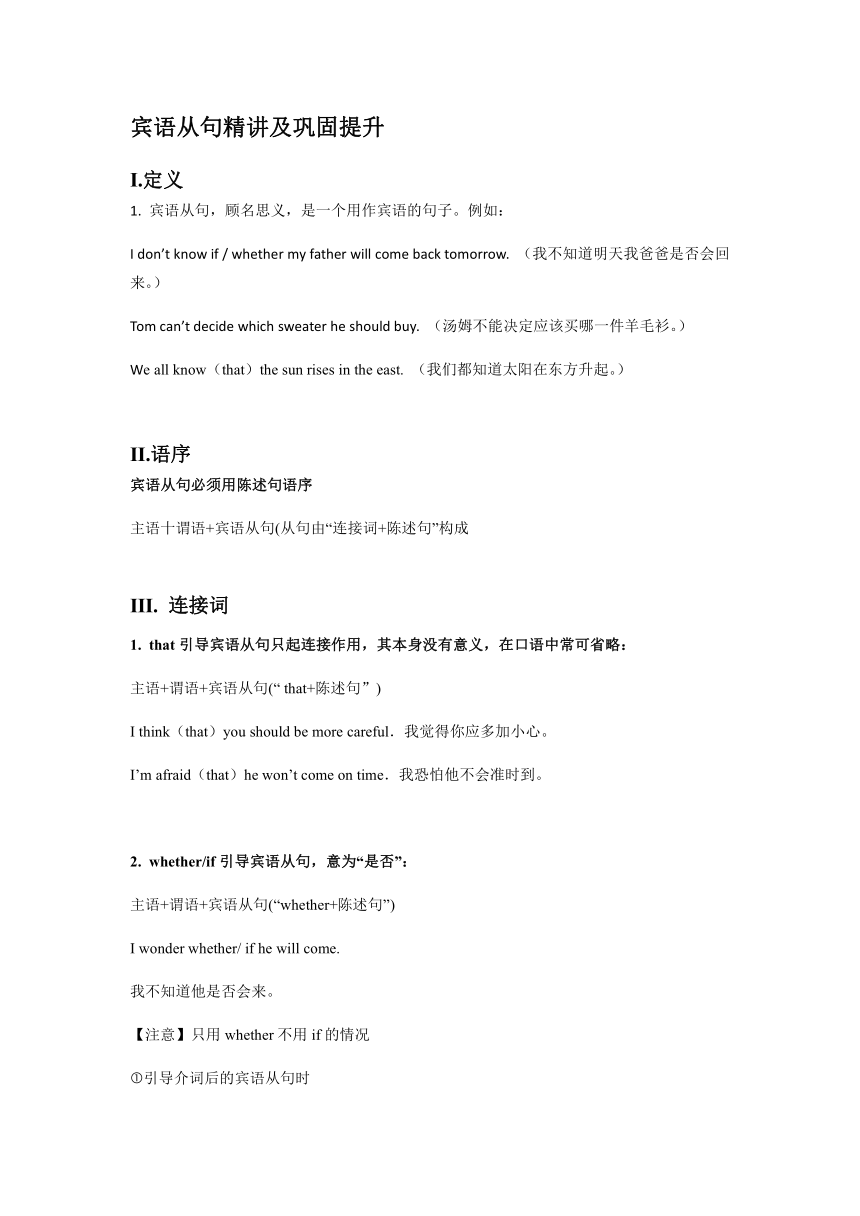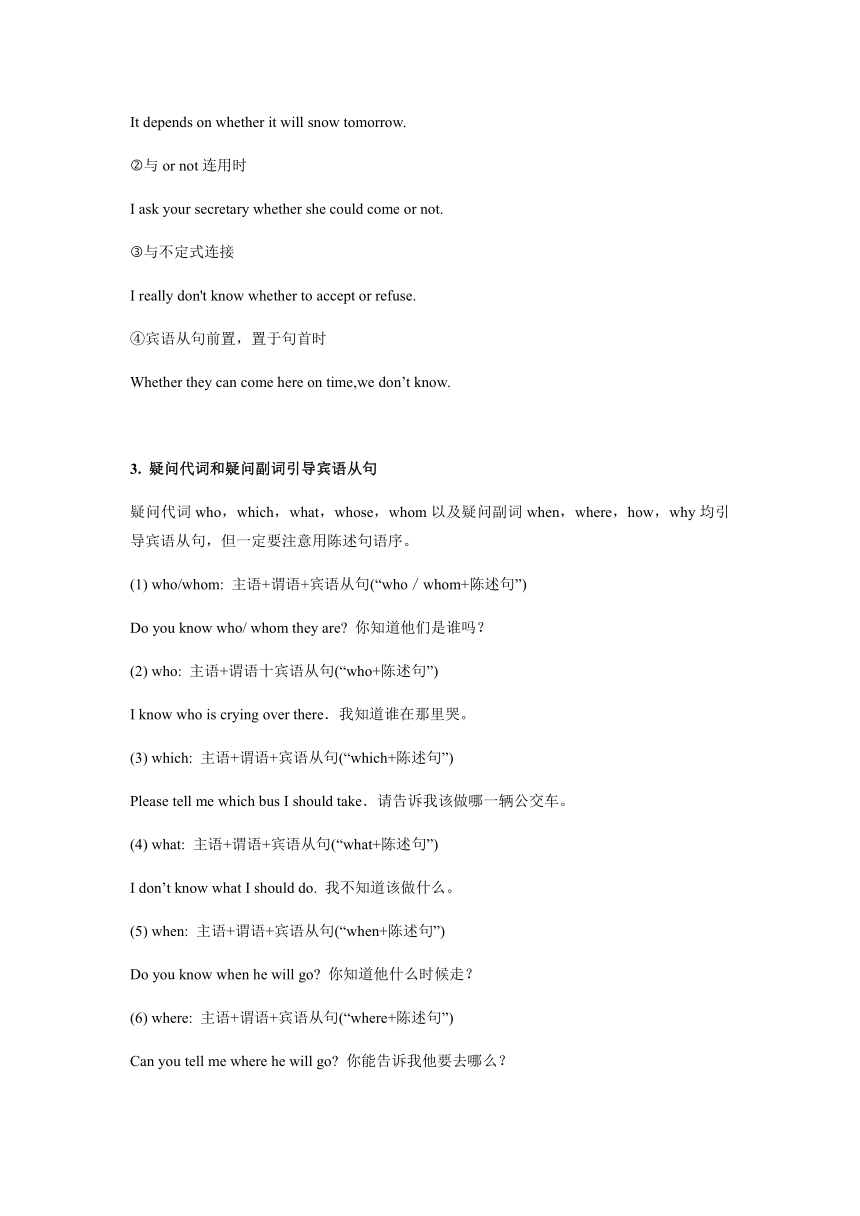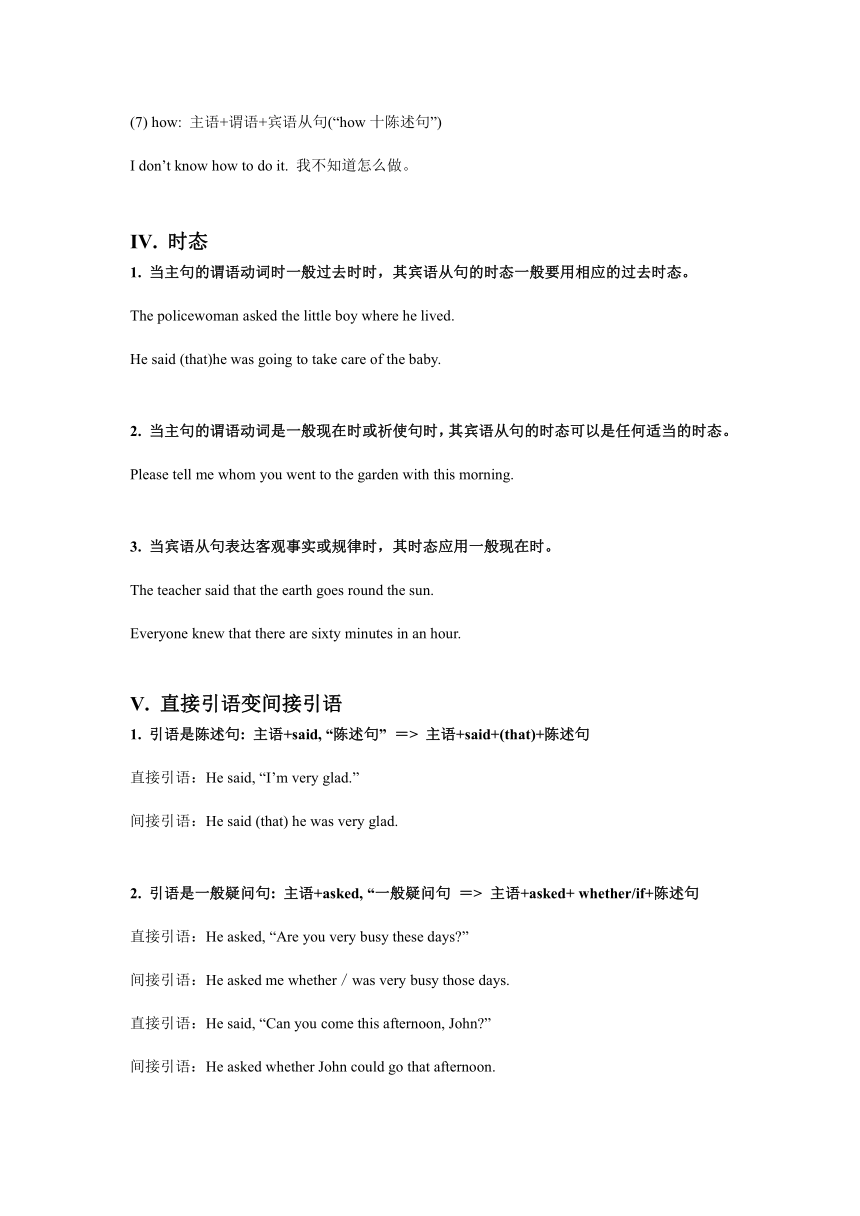牛津上海版八年级下册宾语从句精讲及巩固提升(有答案)
文档属性
| 名称 | 牛津上海版八年级下册宾语从句精讲及巩固提升(有答案) |  | |
| 格式 | docx | ||
| 文件大小 | 25.0KB | ||
| 资源类型 | 教案 | ||
| 版本资源 | 牛津上海版(试用本) | ||
| 科目 | 英语 | ||
| 更新时间 | 2021-01-13 09:34:54 | ||
图片预览



文档简介
宾语从句精讲及巩固提升
Ⅰ.定义
宾语从句,顾名思义,是一个用作宾语的句子。例如:
I don’t know if / whether my father will come back tomorrow. (我不知道明天我爸爸是否会回来。)
Tom can’t decide which sweater he should buy. (汤姆不能决定应该买哪一件羊毛衫。)
We all know(that)the sun rises in the east. (我们都知道太阳在东方升起。)
Ⅱ.语序
宾语从句必须用陈述句语序
主语十谓语+宾语从句(从句由“连接词+陈述句”构成
Ⅲ. 连接词
that引导宾语从句只起连接作用,其本身没有意义,在口语中常可省略:
主语+谓语+宾语从句(“ that+陈述句”)
I think(that)you should be more careful.我觉得你应多加小心。
I’m afraid(that)he won’t come on time.我恐怕他不会准时到。
whether/if引导宾语从句,意为“是否”:
主语+谓语+宾语从句(“whether+陈述句”)
I wonder whether/ if he will come.
我不知道他是否会来。
【注意】只用whether不用if的情况
引导介词后的宾语从句时
It depends on whether it will snow tomorrow.
与or not连用时
I ask your secretary whether she could come or not.
与不定式连接
I really don't know whether to accept or refuse.
④宾语从句前置,置于句首时
Whether they can come here on time,we don’t know.
疑问代词和疑问副词引导宾语从句
疑问代词who,which,what,whose,whom以及疑问副词when,where,how,why均引导宾语从句,但一定要注意用陈述句语序。
(1) who/whom: 主语+谓语+宾语从句(“who/whom+陈述句”)
Do you know who/ whom they are? 你知道他们是谁吗?
(2) who: 主语+谓语十宾语从句(“who+陈述句”)
I know who is crying over there.我知道谁在那里哭。
(3) which: 主语+谓语+宾语从句(“which+陈述句”)
Please tell me which bus I should take.请告诉我该做哪一辆公交车。
(4) what: 主语+谓语+宾语从句(“what+陈述句”)
I don’t know what I should do. 我不知道该做什么。
(5) when: 主语+谓语+宾语从句(“when+陈述句”)
Do you know when he will go? 你知道他什么时候走?
(6) where: 主语+谓语+宾语从句(“where+陈述句”)
Can you tell me where he will go? 你能告诉我他要去哪么?
(7) how: 主语+谓语+宾语从句(“how十陈述句”)
I don’t know how to do it. 我不知道怎么做。
Ⅳ. 时态
当主句的谓语动词时一般过去时时,其宾语从句的时态一般要用相应的过去时态。
The policewoman asked the little boy where he lived.
He said (that)he was going to take care of the baby.
当主句的谓语动词是一般现在时或祈使句时,其宾语从句的时态可以是任何适当的时态。
Please tell me whom you went to the garden with this morning.
当宾语从句表达客观事实或规律时,其时态应用一般现在时。
The teacher said that the earth goes round the sun.
Everyone knew that there are sixty minutes in an hour.
Ⅴ. 直接引语变间接引语
引语是陈述句: 主语+said, “陈述句” => 主语+said+(that)+陈述句
直接引语:He said, “I’m very glad.”
间接引语:He said (that) he was very glad.
引语是一般疑问句: 主语+asked, “一般疑问句 => 主语+asked+ whether/if+陈述句
直接引语:He asked, “Are you very busy these days?”
间接引语:He asked me whether/was very busy those days.
直接引语:He said, “Can you come this afternoon, John?”
间接引语:He asked whether John could go that afternoon.
引语是特殊疑问句: 主语asked, “特殊疑问句” => 主语+asked+疑问词+陈述句
He said, “When do you want to leave?” => He asked me when I wanted to leave.
He said, “What do you want to read?” => He asked me what I wanted to read.
He said, “Where is Mr. Wang?” =>He asked where Mr. Wang was.
引语是祈使句: 主语+ask/tell/ order sb. (not) to do sth.
He said, “Open the door, John!” =>He asked John to open the door.
He said, “Don't talk in class!” => He ordered us not to talk in class.
【注意】
转换过程中时间状语、地点状语、指示代词和某些动词的变化。
直接引语=>间接引语
now => then
today => that day
tonight => that night
yesterday => the day before
tomorrow => the next day
last week => the week before
next week => the next week
in two days => two days later
ago => before
here => there
this => that
these => those
come => go
bring => take
例句
例1 He said, “I am a driver now.”
He told me that he was a driver then.
例2 He said, “I went to Beijing last week.”
He said that he had gone to Beijing the week before.
例3 He asked, “Will you come tomorrow?”
He asked me whether I would go the next day.
例4 He asked, “When will you leave?”
He asked me when I would leave.
例5 He said, “I am having my bike repaired here.”
He said that he was having his bike repaired there.
例6 He asked, “Have you finished reading this book.”
He asked me if I had finished reading that book.
例7 He said, “The earth moves round the sun.”
He said that the earth moves round the sun.
巩固提升:
I. Choose the best answer.
1. Professor Nelson wanted to know .
A. when would the conference begin B. when the conference would begin
C. when will the conference begin D. when the conference will begin
2. I’m new here. Could you tell me , please?
A. when does the first bus arrive B. when the first bus arrives
C. when did the first bus arrive D. when will the first bus arrive
3. — Can you make sure ?
— Sorry, I can't. But I did see her just now.
A. where did she go B. where she had gone
C. where she has gone D. where will she go
4. — Could you please tell me ?
— It’s next to the post office.
A. where is the supermarket B. where the supermarket is
C. where was the supermarket D. where the supermarket was
5. No one can be sure in a million years.
A. what man looks like B. what will man look like
C. man will look like what D. what man will look like
6. I want to know the day after tomorrow.
A. what he will do B. what will he do
C. what he did D. what did he do
7. — By the way, do you know the National Spelling Bee?
— No, I never heard of it. Tell me , please.
A. what is it B. what it is C. it is what D. is it what
8. — I hear we'll have a new teacher this term.
— Really? Do you know ?
A. what subject he teach B. what subject do he teach
C. what subject does he teach D. what subject he teaches
9. Do you know ?
A. what time would the train leave B. what time does the train leave
C. what time will the train leave D. what time the train leaves
10. — Could you tell me ?
— She came here on foot.
A. where Kate came from B. when Kate came here
C. how Kate came here D. why Kate didn't come here
Ⅱ. Rewrite?the?following?sentences?as?required.?(根据所给要求改写下列句子)
“Could you repeat what you said, Jack?” I said. (改为宾语从句)
I asked Jack .
“Are you really very tired?” he asked. (改为宾语从句)
He asked me .
“When do you want to leave, father?” he asked. (改为宾语从句)
He asked his father .
“Stay in bed for a few days,” the doctor said to me. (改为宾语从句)
The doctor told .
“Don’t shout.” I said to Jim. (改为宾语从句)
I told Jim .
Keys:
Ⅰ 1-5 BBCBD 6-10 ABDDC
Ⅱ 1. if he could repeat what he said
2. whether I was really very tired
3. when he wanted to leave
4. me to stay in bed for a few days
5. not to shout
Ⅲ CBACB
Ⅰ.定义
宾语从句,顾名思义,是一个用作宾语的句子。例如:
I don’t know if / whether my father will come back tomorrow. (我不知道明天我爸爸是否会回来。)
Tom can’t decide which sweater he should buy. (汤姆不能决定应该买哪一件羊毛衫。)
We all know(that)the sun rises in the east. (我们都知道太阳在东方升起。)
Ⅱ.语序
宾语从句必须用陈述句语序
主语十谓语+宾语从句(从句由“连接词+陈述句”构成
Ⅲ. 连接词
that引导宾语从句只起连接作用,其本身没有意义,在口语中常可省略:
主语+谓语+宾语从句(“ that+陈述句”)
I think(that)you should be more careful.我觉得你应多加小心。
I’m afraid(that)he won’t come on time.我恐怕他不会准时到。
whether/if引导宾语从句,意为“是否”:
主语+谓语+宾语从句(“whether+陈述句”)
I wonder whether/ if he will come.
我不知道他是否会来。
【注意】只用whether不用if的情况
引导介词后的宾语从句时
It depends on whether it will snow tomorrow.
与or not连用时
I ask your secretary whether she could come or not.
与不定式连接
I really don't know whether to accept or refuse.
④宾语从句前置,置于句首时
Whether they can come here on time,we don’t know.
疑问代词和疑问副词引导宾语从句
疑问代词who,which,what,whose,whom以及疑问副词when,where,how,why均引导宾语从句,但一定要注意用陈述句语序。
(1) who/whom: 主语+谓语+宾语从句(“who/whom+陈述句”)
Do you know who/ whom they are? 你知道他们是谁吗?
(2) who: 主语+谓语十宾语从句(“who+陈述句”)
I know who is crying over there.我知道谁在那里哭。
(3) which: 主语+谓语+宾语从句(“which+陈述句”)
Please tell me which bus I should take.请告诉我该做哪一辆公交车。
(4) what: 主语+谓语+宾语从句(“what+陈述句”)
I don’t know what I should do. 我不知道该做什么。
(5) when: 主语+谓语+宾语从句(“when+陈述句”)
Do you know when he will go? 你知道他什么时候走?
(6) where: 主语+谓语+宾语从句(“where+陈述句”)
Can you tell me where he will go? 你能告诉我他要去哪么?
(7) how: 主语+谓语+宾语从句(“how十陈述句”)
I don’t know how to do it. 我不知道怎么做。
Ⅳ. 时态
当主句的谓语动词时一般过去时时,其宾语从句的时态一般要用相应的过去时态。
The policewoman asked the little boy where he lived.
He said (that)he was going to take care of the baby.
当主句的谓语动词是一般现在时或祈使句时,其宾语从句的时态可以是任何适当的时态。
Please tell me whom you went to the garden with this morning.
当宾语从句表达客观事实或规律时,其时态应用一般现在时。
The teacher said that the earth goes round the sun.
Everyone knew that there are sixty minutes in an hour.
Ⅴ. 直接引语变间接引语
引语是陈述句: 主语+said, “陈述句” => 主语+said+(that)+陈述句
直接引语:He said, “I’m very glad.”
间接引语:He said (that) he was very glad.
引语是一般疑问句: 主语+asked, “一般疑问句 => 主语+asked+ whether/if+陈述句
直接引语:He asked, “Are you very busy these days?”
间接引语:He asked me whether/was very busy those days.
直接引语:He said, “Can you come this afternoon, John?”
间接引语:He asked whether John could go that afternoon.
引语是特殊疑问句: 主语asked, “特殊疑问句” => 主语+asked+疑问词+陈述句
He said, “When do you want to leave?” => He asked me when I wanted to leave.
He said, “What do you want to read?” => He asked me what I wanted to read.
He said, “Where is Mr. Wang?” =>He asked where Mr. Wang was.
引语是祈使句: 主语+ask/tell/ order sb. (not) to do sth.
He said, “Open the door, John!” =>He asked John to open the door.
He said, “Don't talk in class!” => He ordered us not to talk in class.
【注意】
转换过程中时间状语、地点状语、指示代词和某些动词的变化。
直接引语=>间接引语
now => then
today => that day
tonight => that night
yesterday => the day before
tomorrow => the next day
last week => the week before
next week => the next week
in two days => two days later
ago => before
here => there
this => that
these => those
come => go
bring => take
例句
例1 He said, “I am a driver now.”
He told me that he was a driver then.
例2 He said, “I went to Beijing last week.”
He said that he had gone to Beijing the week before.
例3 He asked, “Will you come tomorrow?”
He asked me whether I would go the next day.
例4 He asked, “When will you leave?”
He asked me when I would leave.
例5 He said, “I am having my bike repaired here.”
He said that he was having his bike repaired there.
例6 He asked, “Have you finished reading this book.”
He asked me if I had finished reading that book.
例7 He said, “The earth moves round the sun.”
He said that the earth moves round the sun.
巩固提升:
I. Choose the best answer.
1. Professor Nelson wanted to know .
A. when would the conference begin B. when the conference would begin
C. when will the conference begin D. when the conference will begin
2. I’m new here. Could you tell me , please?
A. when does the first bus arrive B. when the first bus arrives
C. when did the first bus arrive D. when will the first bus arrive
3. — Can you make sure ?
— Sorry, I can't. But I did see her just now.
A. where did she go B. where she had gone
C. where she has gone D. where will she go
4. — Could you please tell me ?
— It’s next to the post office.
A. where is the supermarket B. where the supermarket is
C. where was the supermarket D. where the supermarket was
5. No one can be sure in a million years.
A. what man looks like B. what will man look like
C. man will look like what D. what man will look like
6. I want to know the day after tomorrow.
A. what he will do B. what will he do
C. what he did D. what did he do
7. — By the way, do you know the National Spelling Bee?
— No, I never heard of it. Tell me , please.
A. what is it B. what it is C. it is what D. is it what
8. — I hear we'll have a new teacher this term.
— Really? Do you know ?
A. what subject he teach B. what subject do he teach
C. what subject does he teach D. what subject he teaches
9. Do you know ?
A. what time would the train leave B. what time does the train leave
C. what time will the train leave D. what time the train leaves
10. — Could you tell me ?
— She came here on foot.
A. where Kate came from B. when Kate came here
C. how Kate came here D. why Kate didn't come here
Ⅱ. Rewrite?the?following?sentences?as?required.?(根据所给要求改写下列句子)
“Could you repeat what you said, Jack?” I said. (改为宾语从句)
I asked Jack .
“Are you really very tired?” he asked. (改为宾语从句)
He asked me .
“When do you want to leave, father?” he asked. (改为宾语从句)
He asked his father .
“Stay in bed for a few days,” the doctor said to me. (改为宾语从句)
The doctor told .
“Don’t shout.” I said to Jim. (改为宾语从句)
I told Jim .
Keys:
Ⅰ 1-5 BBCBD 6-10 ABDDC
Ⅱ 1. if he could repeat what he said
2. whether I was really very tired
3. when he wanted to leave
4. me to stay in bed for a few days
5. not to shout
Ⅲ CBACB
